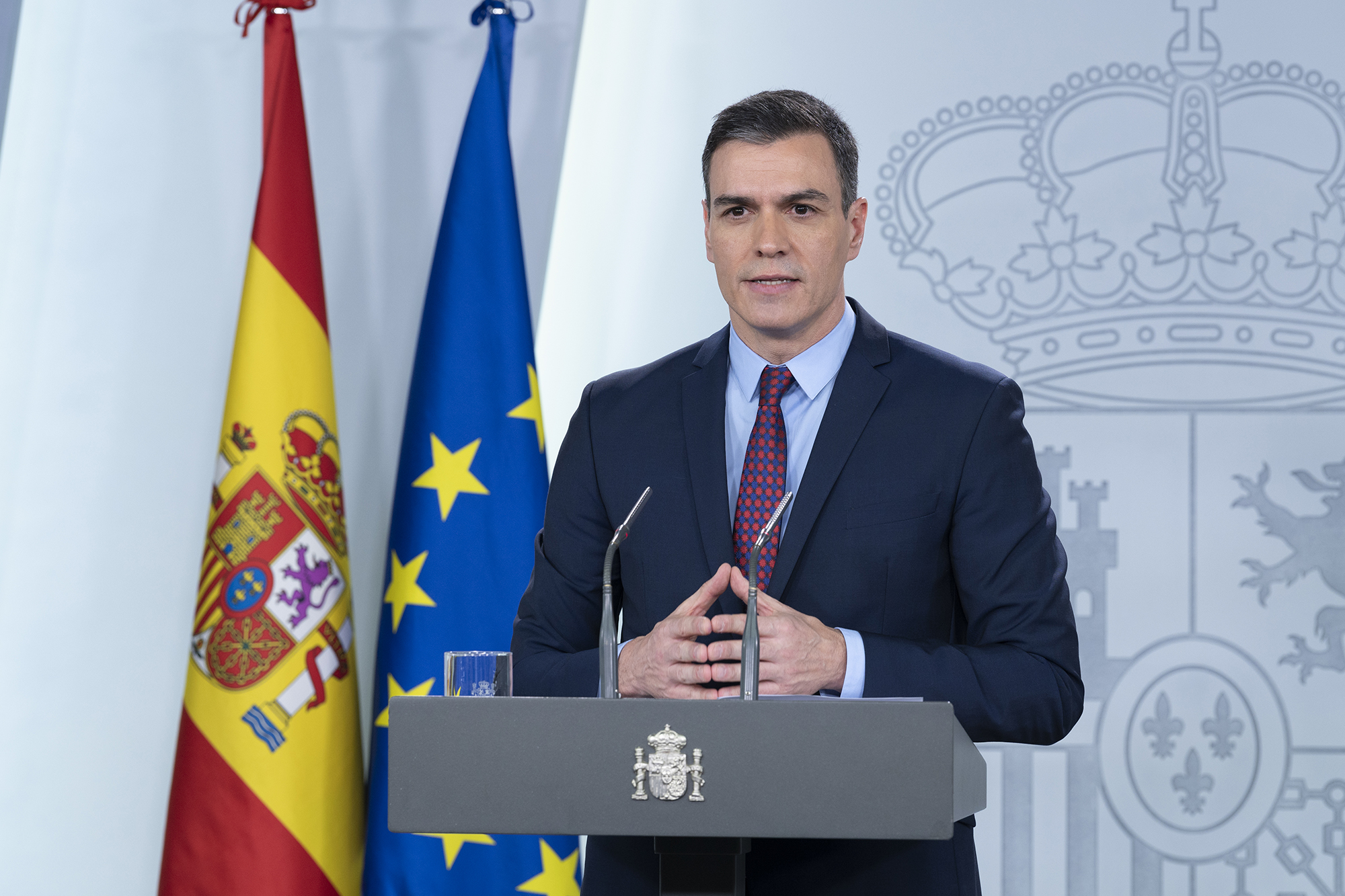Spanish Prime Minister Pedro Sánchez ignited a political firestorm after suggesting that he would like to stop Israel’s military campaign in Gaza but cannot, as it lacks nuclear weapons. The controversial remarks—largely ignored in international media but widely reported in Spain—were delivered during a press event on Monday in which Sánchez announced sweeping sanctions against Israel, including an arms embargo and partial import ban.
“Spain, as you know, doesn’t have nuclear bombs, nor aircraft carriers, nor large oil reserves,” Sánchez told reporters. “We alone can’t stop the Israeli offensive. But that doesn’t mean we won’t stop trying, because there are causes that are worth fighting for, even if winning them isn’t in our sole power.”
Spain's Prime Minister Pedro Sánchez:
— Clash Report (@clashreport) September 11, 2025
Spain does not have nuclear bombs, aircraft carriers or large oil reserves.
We alone cannot stop the Israeli offensive. But that doesn't mean we are going to stop trying.
Because there are causes that are worth fighting for, even if… pic.twitter.com/sVZaCPie9m
These remarks were immediately interpreted by many as a veiled threat toward the State of Israel, suggesting that the Spanish leader might consider the use of nuclear weapons—if Spain had them—as a means to intervene in the conflict. The rhetorical leap stunned Israeli officials and drew fierce backlash from across the political spectrum, both in Spain and abroad.
Prime Minister Benjamin Netanyahu responded forcefully on Thursday, calling Sánchez’s comments “a blatant genocidal threat to the world’s only Jewish State.”
Prime Minister's Office:
— Prime Minister of Israel (@IsraeliPM) September 11, 2025
Spanish PM Sanchez said yesterday that Spain can’t stop Israel’s battle against Hamas terrorists because ‘Spain does not have nuclear weapons.’ That’s a blatant genocidal threat on the world’s only Jewish State.
“Spanish PM Sánchez said yesterday that Spain can’t stop Israel’s battle against Hamas terrorists because ‘Spain does not have nuclear weapons,’” Netanyahu wrote on X (formerly Twitter). “Apparently, the Spanish Inquisition, the expulsion of the Jews of Spain and the systematic mass murder of Jews in the Holocaust is not enough for Sánchez.”
The rhetoric drew further rebuke from Israeli Foreign Minister Gideon Sa’ar, who imposed sanctions on two Spanish ministers, accusing Spain of “advancing antisemitic policies.” Sa’ar blasted Sánchez’s administration for what he called a “hostile, anti-Israel line, marked by wild, hate-filled rhetoric,” and said the prime minister was using inflammatory language to “divert attention from grave corruption scandals.”
The fallout inside Spain was just as intense. Santiago Abascal, the leader of the far-right Vox party, slammed Sánchez, saying: “Sánchez would like to have nuclear weapons… but not to defend Spain. To defend Hamas. And surely Maduro too. Cornered tyrants always end up going mad.”
Carlos Díaz-Pache, a spokesman for the center-right Popular Party, expressed disbelief: “A nuclear bomb on Tel Aviv? Is that what he intends to do?” He accused Sánchez of “aligning himself with Hamas terrorism with a repugnant antisemitic statement.”
Critics have accused Sánchez of exploiting the Israel-Gaza war to distract from domestic scandals, including a corruption probe involving his wife, Begoña Gómez, who is scheduled to testify in court this week.
The Combat Antisemitism Movement (CAM) has called for Sánchez’s remarks to be investigated in international legal courts, suggesting that they may constitute incitement to genocide.
“These disgusting and inflammatory comments have violently ripped off the mask of Prime Minister Sánchez, who claims to be acting on behalf of humanitarian intentions, when his secret desire appears to be militarily attacking Israel, even with the use of weapons of mass destruction,” CAM CEO Sacha Roytman Dratwa said in a statement.
CAM compared Sánchez’s remarks to those made by Palestinian Authority senior official Jibril Rajoub, who once said: “If we had nuclear weapons, we’d be using them,” and former Iranian President Mahmoud Ahmadinejad, who described Israel as “a one-bomb country.”
CAM has demanded an “unreserved apology” from Sánchez and warned that if none is forthcoming, international legal action should be pursued.
Sánchez’s comments mark a dramatic escalation in tensions between Spain and Israel—a relationship that has long been marked by political ambivalence and historical baggage.
It wasn’t until 1986 that Spain formally established diplomatic ties with Israel, making it one of the last Western European nations to do so. For decades, Spain’s foreign policy had leaned toward courting the Arab world, particularly during the Franco era and its aftermath. Madrid often positioned itself as a neutral party in the Arab-Israeli conflict, reflecting its energy dependencies and historical ties in the Mediterranean and North Africa.
Since taking office, Sánchez and his left-wing government have pushed this legacy even further, taking positions increasingly hostile to Israel. Last year, Spain broke with key European allies by unilaterally recognizing a Palestinian state—an act that infuriated Israel and led to sharp diplomatic exchanges. In response to the war sparked by Hamas’s October 7, 2023, massacre of over 1,200 Israelis, Spain’s government has aggressively positioned itself as a moral voice against what Sánchez has called “genocide” in Gaza.
While other European countries such as France and the UK are preparing to recognize a Palestinian state in the coming months, none have used rhetoric as inflammatory or threatening as Sánchez’s. His administration’s announcement this week of a legally binding arms embargo against Israel further deepened the divide.
In response to the deteriorating situation, Spain has recalled its ambassador from Tel Aviv for consultations.
The diplomatic war of words shows no sign of slowing, and what was once a fragile relationship between Spain and Israel now appears on the verge of total collapse.




